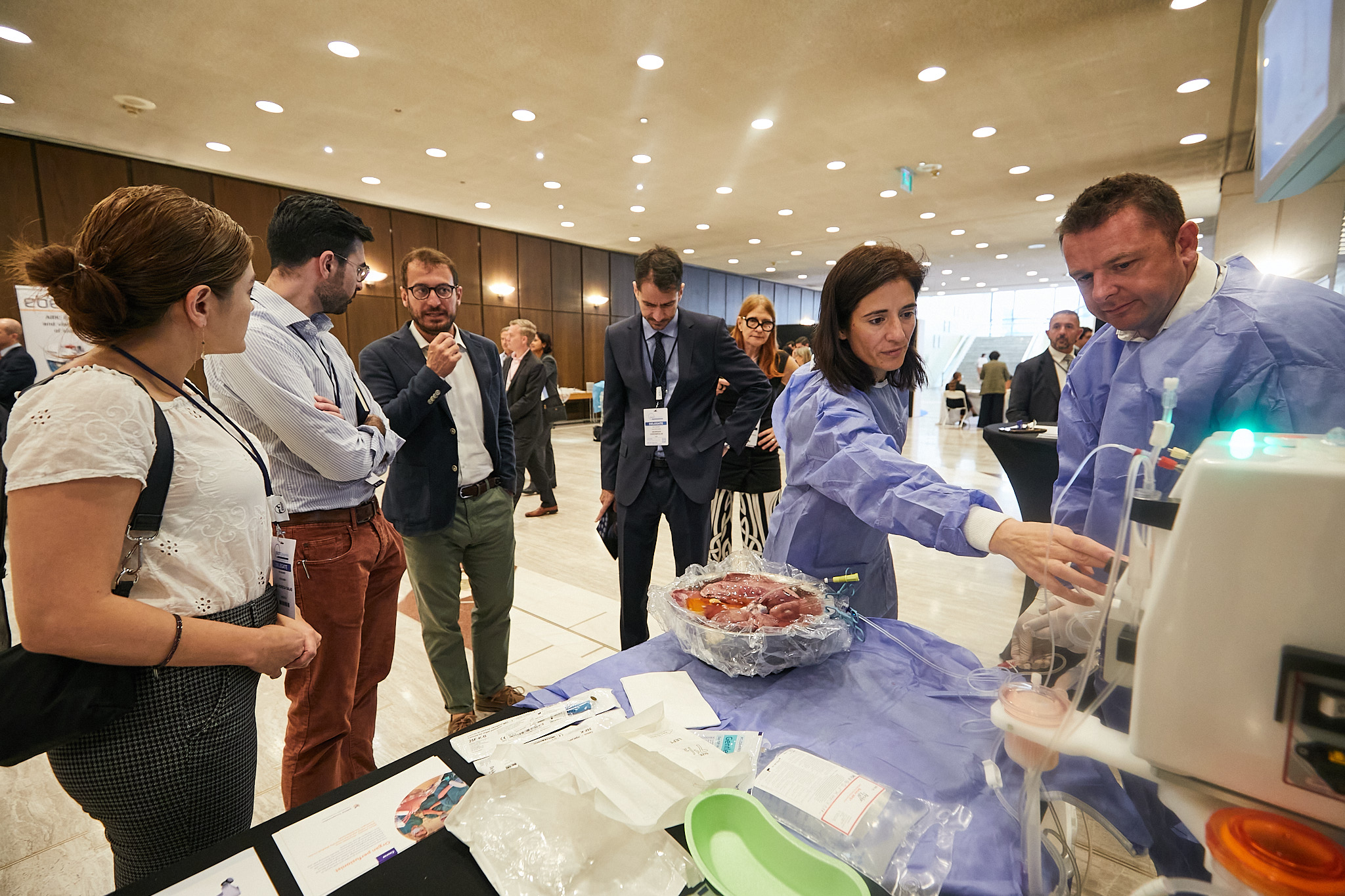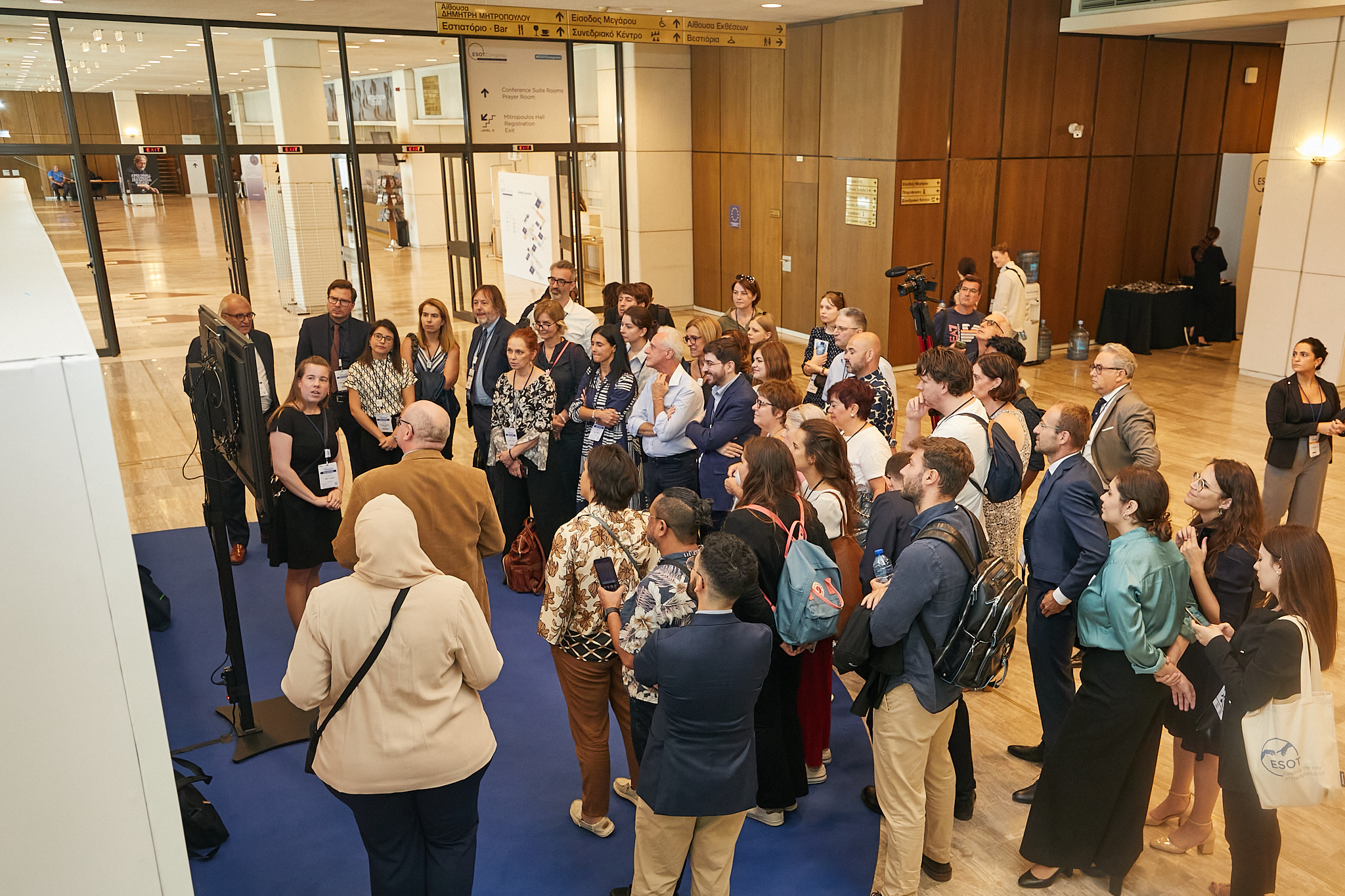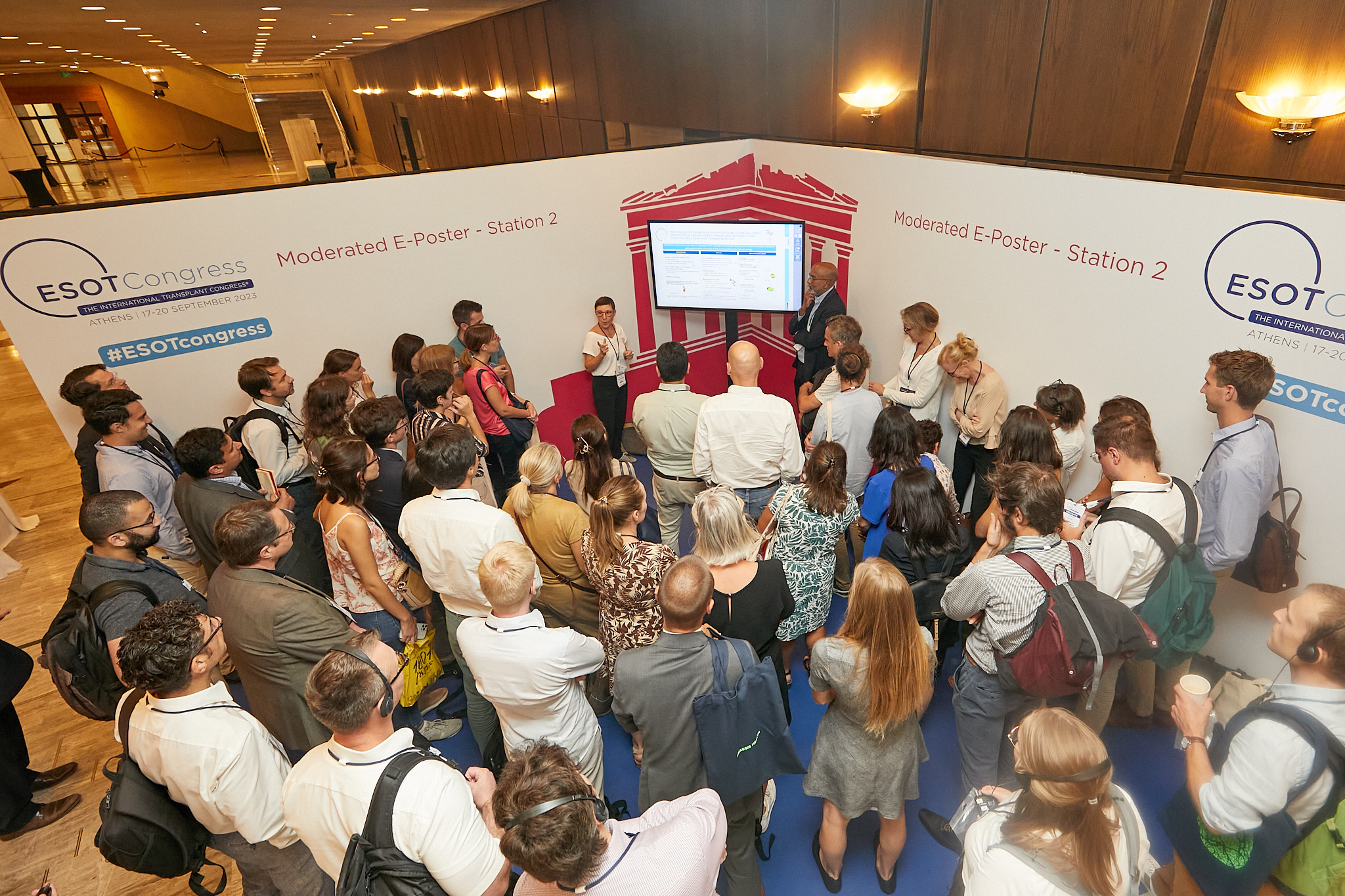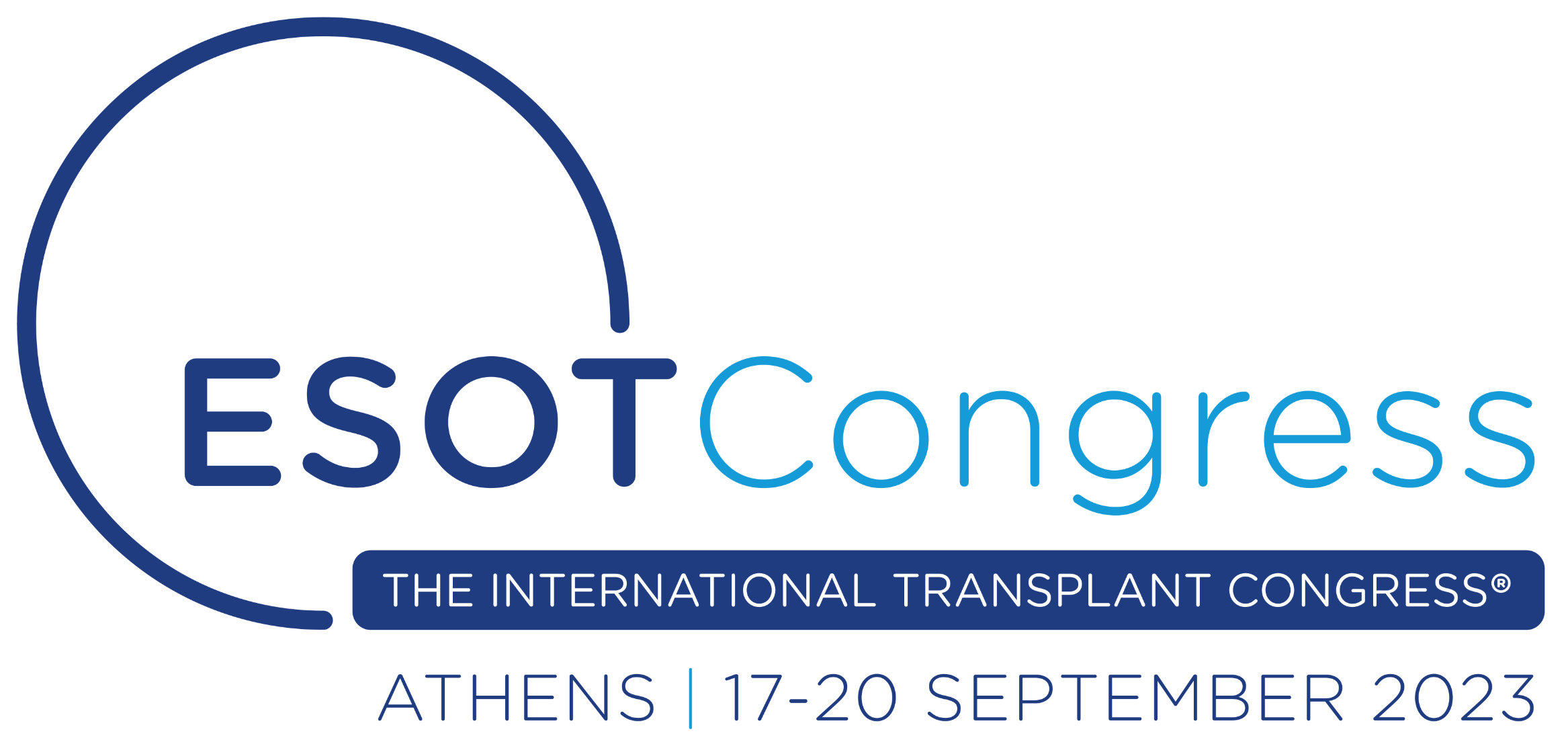Daily Recap: Day 3
Tuesday 19 September
Welcome to Day 3 of the ESOT Congress 2023!
On the third day of the ESOT Congress 2023, we uncovered more hot topics in the scientific programme, concluded the hands-on courses, and celebrated outstanding contributions to the field with more congress awards.

Scientific Highlight
High symptom burden in kidney transplant recipients linked to poor clinical outcomes
An analysis from the TransplantLines biobank and cohort study in the Netherlands has revealed a connection between a high symptom burden in kidney transplant recipients (KTRs) and adverse clinical outcomes. The study emphasises the importance of implementing effective strategies and treatments to alleviate this burden.
Kidney transplantation is often associated with poor patient-reported outcomes, particularly in terms of health-related quality of life (HRQoL), due to disease-related symptoms or post-transplant medication. In this large, prospective cross-sectional study conducted between 2015 and 2022, researchers assessed a wide range of symptoms and their impact on KTRs’ well-being. The study, which included 936 KTRs, found that higher symptom burden scores were associated with lower mental and physical HRQoL, medication non-adherence, depression and reduced societal participation. The most common symptoms reported were tiredness, bruises, and lack of energy, with menstrual problems (in women), impotence (in men) and joint pain being the most distressing symptoms.
Riemersma N, et al. Symptom burden in kidney transplant recipients: a cross-sectional study. Presented at the ESOT Congress 2023; 19 September 2023; Athens, Greece.

Hands-on courses
Machine perfusion courses in a wet lab setting
Machine perfusion is a major focus within this year’s scientific programme, with its growing influence prompting new questions in the field.
Over the past two days, five dedicated hands-on sessions have provided an exclusive opportunity for delegates to actively engage and learn alongside experts. With an aim of furthering machine perfusion knowledge, our state-of-the-art practical courses have offered a valuable opportunity for attendees of the ESOT Congress 2023 to gain first-hand experience in liver, kidney, heart and lung perfusion.
Attendees joined leading experts in a wet lab setting to be guided and tutored through a series of practical machine perfusion techniques. Rotating through a range of workshops, participants enhanced their knowledge, experience and technical abilities.

Scientific Highlight
Individualised Mediterranean diet reduced risk of metabolic syndrome after heart transplant
Dietary intervention with an individualised approach and a Mediterranean diet has yielded positive outcomes in heart transplantation (HTx) patients, including improved medication adherence, body composition and reduced risk of metabolic syndrome (MetS). These benefits were most pronounced at the 6-month post-transplant mark and continued to improve up to 1 year after implementing this approach.
HTx patients are vulnerable to developing MetS due to the side effects of immunosuppressive therapy, making dietary strategies crucial. In an Italian-based study, patients recorded their dietary habits over 4 days and received personal nutritional guidance during scheduled visits at baseline, 6 months, and 12 months.
These interventions led to significant improvements in dietary habits, with Mediterranean diet scores increasing from 4.5 to 6.0 at 12 months, along with reduced total energy intake and increased consumption of beneficial nutrients. Additionally, patients exhibited positive changes in body composition, including decreased fat mass and increased fat-free mass, already noticeable at the 6-month mark. Importantly, the criteria for MetS diagnosis improved progressively, with reductions from 50% at baseline to 29% at 12 months.
Sponga S, et al. Mediterranean diet and metabolic syndrome: a dietary intervention study to reduce metabolic syndrome risk after heart transplantation. Presented at the ESOT Congress 2023; 19 September 2023; Athens, Greece.

Best Cardiothoracic Abstract Award
Acknowledging excellence in heart and lung research
The Best Cardiothoracic Abstract Award is a new award which recognises the author of the best abstract submitted to the ESOT Congress 2023 on heart and/or lung topics.
Congratulations to Lisa Coscia from the US who was presented the award today by ECTTA Vice-Chair Cristiano Amarelli. Lisa Coscia’s research, titled ‘Pregnancy after heart transplant’, analysed pregnancy outcomes in heart transplant recipients and the study is recognised as the largest reported series of pregnancies in heart transplant recipients to date.

Scientific Highlight
Development of a novel ‘Liver Atlas’ to predict pre-retrieval steatosis may help avoid unnecessary liver discards
A novel, large-scale ‘Liver Atlas’ supports the use of pre-retrieval steatosis predictors and routine retrieval biopsy to avoid unnecessary liver discards. Hepatic steatosis is often associated with poor outcomes following liver transplantation. A group from the UK have developed the first large-scale ‘Liver Atlas’ database from livers of deceased donors. Using this as a reference source, investigators assessed the incidence of biopsy-confirmed steatosis, identified predictors of steatosis severity present prior to liver retrieval and evaluated the impact of steatosis severity on retrieval, utilisation and donor graft/recipient outcomes. The study utilised a database of 1048 consecutive deceased donor biopsies, quantifying steatosis severity through artificial intelligence-based image analysis (imageDxTM). Of 906 donor livers, differences in predictors, clinical risk scores and biochemical measurements were observed across different steatosis severity levels, with gamma-glutamyl transpeptidase showing potential in detecting differences.
While 75.6% of the livers were retrieved for transplantation, only 57.1% of surgeon-assisted steatosis severity grades matched those generated by imageDxTM. As steatosis severity increased, the proportion of livers used for transplantation decreased with a subsequent impact on 12–month graft and patient survival, though not statistically significant. Genetic analysis of this cohort, currently underway, aims to identify specific variables associated with heightened steatosis, potentially enabling the selective use of steatosis predictors to reduce unnecessary discards in routine biopsy retrieval.
Abbas H, et al. Development of a ‘Liver Atlas’ using over 1000 consecutive deceased donor livers to identify hepatic steatosis prior to retrieval. Presented at the ESOT Congress 2023; 19 September 2023; Athens, Greece.

Marius Renard Paediatric Transplant Award ESOT and IPTA
Recognising achievements in paediatric transplantation science
The Marius Renard Paediatric Transplant Award is a joint ESOT and IPTA award to recognise the best abstract submitted to the congress within the field of paediatric transplantation. Abstracts considered for this award were focused on advancing the field through either clinical innovation or scientific research.
Last night, Jon Jin Kim from the UK was announced as the winner of this award for his outstanding abstract titled, ‘Molecular HLA mismatching for prediction of primary humoral alloimmunity and graft function deterioration in paediatric kidney transplantation’. Jon Jin Kim received a certificate of achievement, a €500 prize, and he was invited to submit his work to Transplant International.
Congratulations Jon Jin Kim!

Scientific Highlight
iBox system enabled accurate prediction of long-term failure after kidney transplantation in children
A multinational study has demonstrated the effectiveness of the iBox scoring system in predicting long-term kidney graft failure in children, yielding outcomes similar to those observed in adults. This risk prediction tool offers valuable applications in paediatric patient monitoring and as a potential endpoint in clinical trials. Addressing the clinical need for predicting long-term kidney graft failure in children, the study validated a risk prediction system using a large cohort of paediatric kidney transplant (kTx) patients from Europe and the US who received transplants between 2004 and 2017.
The evaluation encompassed various graft assessments, including urinary analysis (estimated glomerular filtration rate [eGFR] and urine protein-creatinine ratio [UPCR]), graft fibrosis development (presence of circulating anti-human leukocyte antigen donor-specific antibodies [anti-HLA DSA]), and kidney graft histology employing the Banff international classification. Utilising the iBox system, the study accurately predicted graft failure up to a decade after evaluation, achieving a concordance index of 0.81 (95% CI: 0.75 – 0.87), signifying its ability to describe observed events and offering a valuable tool for paediatric kidney transplant management and clinical trial optimisation.
Hogan J, et al. Validation of a prediction system for risk of allograft loss (iBox) in pediatric kidney transplant recipients. Presented at the ESOT Congress 2023; 19 September 2023; Athens, Greece.


